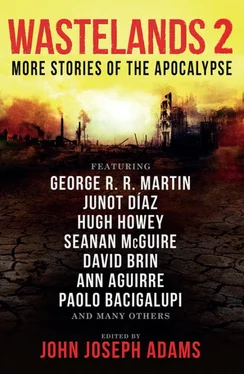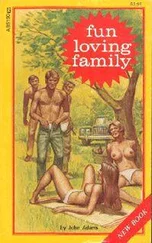“It’s worth nothing if we dry out.”
From Faruk’s expression, Keraf could not tell if the man was simply negotiating. The Atlantic Basin was isolated, and opportunities to maintain his clan’s genetic viability could not have presented themselves often. Pressing the issue this early in a negotiation could offend.
“You have the advantage,” Keraf said. “My rifle is worth something, as is my water bag. I’m willing to work for a ration.”
Faruk looked unimpressed.
“I beg your compassion. My mission is important.”
“He says he carries something that could save us,” Imani said. The toddler squirmed in her arms, and she set him down. The boy hid behind her robes and poked his tongue out at Keraf through his cleft.
“The Earth is dead,” Faruk said. “Those who believe otherwise are chasing fantasies in the dust.”
“What if he speaks the truth? We can spare—”
Faruk hissed and the girl fell silent. The toddler started to cry. The tears on his cheek made Keraf’s mouth water.
Imani knelt and pulled the boy into her arms, quieting him. She collected his tears on her fingertips and put them in her mouth.
Keraf pretended to ignore the exchange, even as his mind tried to construct what Imani had intended to say. Could they spare water? No one could spare water, for there was none to spare.
“Let me show you.” Keraf slowly unclipped the metal cylinder from his belt and unscrewed the cap on one end. “These are copies of a document discovered by my Order.” Keraf removed a tube of handmade paper and carefully unrolled it. It was covered with intricate lines and neat blocks of hand-printed text. “It is a plan for a deep drilling machine, but my lamasery lacks the resources to construct it. The Mechanist Court at Costa de Santo can build it, and if they do, they can bring water to the surface.”
Faruk studied the document for a moment, but Keraf suspected the man could not decipher it. Without water, industrialization and the skills associated with it had collapsed. Other than condensers, little remained from the wet-Earth.
Faruk’s lips pulled downward into a frown. He waved the paper aside. “The deep ocean? A myth. I won’t spend time looking at what I don’t have, only to lose sight of what I do. My grandniece should do the same, for her son. We cannot help you. We have no water to spare.”
“Please, I am at your mercy.” Keraf reached for Faruk, but the man stepped back.
Faruk pushed aside a fold of his robe to reveal a revolver in his belt. “It’s best you be on your way.”
Imani grabbed her great uncle’s arm. “You talk of the future, but my son has no—”
Faruk pulled his arm free. “Enough!”
Imani lowered her face.
“How long will your condensers last?” Keraf tried to keep the desperation out of his voice. “Ours run on sweat and prayer. Out here, it must be—” An odd sound drew Keraf’s eyes to the toddler. The boy was peeing on the sand.
Keraf dropped the paper. His eyes grew wide. “You have found water,” he whispered, as he fell to his knees.
Faruk drew the pistol from his belt. In a single fluid motion, he leveled it at Keraf’s chest.
Keraf could not take his eyes off the arc of lemon-yellow water. The toddler did not have the genetic modification to produce uric acid instead of urine. He would need over a gallon of water a day to survive; yet he lived.
The toddler finished peeing, and Imani scooped him into her arms. Keraf watched the puddle sink into the dust. He ached to hold the wet sand in his hands.
Faruk pulled back the hammer on his revolver.
“Don’t, Uncle,” Imani said.
“He will bring others. They will take what we have.”
“But the drilling machine…”
“Those drawings are probably not even real,” Faruk said. “A ruse to steal water from our mouths.”
“Already the seep gives less than it once did. If the paper he carries can bring back the water…” Imani squeezed the toddler in her arms. The boy squirmed but could not slip free.
Keraf stared, no longer seeing the toddler’s cleft lip. “Your child is the future,” he said, “one where we have enough water to wet the ground with our urine.” He looked up the revolver’s barrel, past the three bullets arrayed in the chambers. “I have dedicated my life to bringing water back to the world,” he said. “I have heard it used to fall from the sky. I have never seen such a thing, but I dream that our children will. If you shoot me, at least deliver these plans to Costa de Santo. I believe they can save us.”
Faruk’s eyebrows pinched together. “Why do you believe?”
“If I do not, then everything is just dust.” Keraf waited for the bullet. He imagined a heaven with cool rain.
The pistol wavered. “The last time I saw the rain, I was a small boy,” Faruk said. “We ran outside with pots and plates and cloths—anything that could hold water. It rained for less than a minute—only a fine mist really—but enough to dampen my face.” He touched his cheeks, as if wiping moisture from them. “I will never forget that.”
Keraf licked his lips, trying to imagine what rain would taste like. “Sometimes it is hard not to lose hope,” he said.
Faruk lowered the revolver. “Hope is a powerful thing.” He picked up the paper at his feet, carefully rolled it, and handed it back to Keraf. “Come.”
Keraf followed Faruk up the embankment, leaving the others to dismantle the canopy. As he crested the top, Keraf stopped.
Below, in the dusty trough, a dozen dome-shaped dwellings ringed a small greenhouse. Through beads of water sparkling on the greenhouse glass, Keraf saw a pool of water nestled among green leaves. He drew an audible breath.
“Without hope, we are dust,” Faruk said. “Before you leave, we will share water.”
BY FOOLS LIKE ME
NANCY KRESS
Hope creeps quietly into my bedroom without knocking, peering around the corner of the rough doorjamb. I’m awake; sleep eludes me so easily now. I know from the awful smell that she has been to the beach.
“Come in, child, I’m not asleep.”
“Grandma, where’s Mama and Papa?”
“Aren’t they in the field?” The rains are late this year and water for the crops must be carried in ancient buckets from the spring in the dell.
“Maybe. I didn’t see them. Grandma, I found something.”
“What, child?”
She gazes at me and bites her lip. I see that this mysterious find bothers her. Such a sensitive child, though sturdy and healthy enough, God knows how.
“I went to the beach,” she confesses in a rush. “Don’t tell Mama! I wanted to dig you some trunter roots because you like them so much, but my shovel went clunk on something hard and I… I dug it up.”
“Hope,” I reprimand, because the beach is full of dangerous bits of metal and plastic, washed up through the miles of dead algae on the dead water. And if a soot cloud blows in from the west, it will hit the beach first.
“I’m sorry,” she says, clearly lying, “but, Grandma, it was a metal box and the lock was all rusted and there was something inside and I brought it here.”
“The box?”
“No, that was too heavy. The… just wait!”
No one can recognize most of the bits of rusted metal and twisted plastic from before the Crash. Anything found in a broken metal box should be decayed beyond recognition. I call, “Hope! Don’t touch anything slimy—” but she is already out of earshot, running from my tiny bedroom with its narrow cot, which is just blankets and pallet on a rope frame to keep me off the hard floor. It doesn’t; the old ropes sag too much, just as the thick clay walls don’t keep out the heat. But that’s my fault. I close the window shutters only when I absolutely have to. Insects and heat are preferable to dark. But I have a door, made of precious and rotting wood, which is more than Hope or her parents have on their sleeping alcoves off the house’s only other room. I expect to die in this room.
Читать дальше












